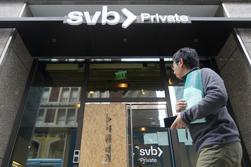 A pedestrian passes a Silicon Valley Bank (SVB) branch in San Francisco on March 13, 2023. Local experts have ruled out any financial turmoil in Hong Kong after the swift downfall of SVB threw the global market for a loop, but hinted that an even bumpier ride may be ahead for the city's economy and capital market amid uncertain US hike bets. (PHOTO / AP)
A pedestrian passes a Silicon Valley Bank (SVB) branch in San Francisco on March 13, 2023. Local experts have ruled out any financial turmoil in Hong Kong after the swift downfall of SVB threw the global market for a loop, but hinted that an even bumpier ride may be ahead for the city's economy and capital market amid uncertain US hike bets. (PHOTO / AP)
Local experts have ruled out any financial turmoil in Hong Kong after the swift downfall of Silicon Valley Bank (SVB) threw the global market for a loop, but hinted that an even bumpier ride may be ahead for the city’s economy and capital market amid uncertain US hike bets.
“The single wobble of SVB is more of a regional issue that won’t harm Hong Kong’s financial stability as the US authorities have stepped in to stem the financial fallout,” said Linus Yip Sheung-chi, chief strategist at First Shanghai Securities.
Once America’s 16th-biggest lender, California-based SVB — which focused primarily on tech startups — was shut down by regulators last Friday after customers pulling their deposits caused a bank run
“However, the banking crisis may disrupt the Federal Reserve’s pace of rate hikes to cool its economy and thus add a dose of uncertainty to Hong Kong’s recovery this year,” he added.
Once America’s 16th-biggest lender, California-based SVB — which focused primarily on tech startups — was shut down by regulators last Friday after customers pulling their deposits caused a bank run.
The 40-year-old lender had long been considered the backbone of many startups and venture capital funds across the globe given its intimate links to the technology community. Its downfall jolted the world as the biggest banking failure since the 2008 financial crisis, prompting the US Treasury and Federal Reserve to move to ensure that depositors affected by the regional banks have access to their cash this week.
ALSO READ: SVB demise a wake-up call to banks
Andy Kwan Cheuk-chiu, director of the ACE Centre for Business and Economic Research, attributed SVB’s demise to mismanagement of the interest rate risk, as it was sitting on too many long-term bonds and mortgage-backed securities, and the hawkish rate hike cycle significantly hurt its asset prices.
“Nevertheless, it’s reasonable to believe such a case won’t be seen in Hong Kong’s banking system,” said Kwan, adding that the city has a very safe level of capital adequacy ratio – a measurement of a lender’s available capital expressed as a percentage of its risk-weighted credit exposures.
The banking failure also sparked market speculation that the Federal Reserve may weigh up slowing its pace of interest rate hikes – a move that could prompt a sigh of relief from the market and investors globally.
“Next week, the Fed is very likely to raise its base rate by only 25 basis points, rather than 50 basis points as previously expected, in consideration of the recent banking crisis,” said Conita Hung Lai-ping, investment strategy director at Tiger Faith Asset Management. “This would be a piece of good news for Hong Kong as it may help relieve some recent pressure on (the) local currency’s depreciation and flagging asset prices.”
READ MORE: HSBC acquires British arm of stricken Silicon Valley Bank
However, she noted that a potential slowdown in the tightening speed may also compound the city’s recovery in the long term as it would put the Fed in an awkward position to form monetary policies.
Since last year, the Fed has raised the target range for its benchmark interest rate by more than 4 percentage points to fight soaring inflation.
The Hong Kong Monetary Authority has followed suit to maintain the local currency’s peg with the greenback. According to the HKSAR government’s initial estimates, Hong Kong’s economy last year recorded its third negative growth since 2019, shrinking by 3.5 percent in part due to the global monetary tightening.
“The collapse of SVB, combined with solid consumer spending and a strong labor market in the US, is creating new confusion over the American central bank’s approach to controlling inflation, which may prolong the suffering in other economies including Hong Kong,” Hung said.
“The recovery of Hong Kong’s economy and financial sector still hinges on when the Fed is going to pause,” she added. “Nobody knows if there’s any other financial collapse in the fallout from this volatile environment, so it would be wise to take a cautious approach when evaluating the city’s outlook.”


